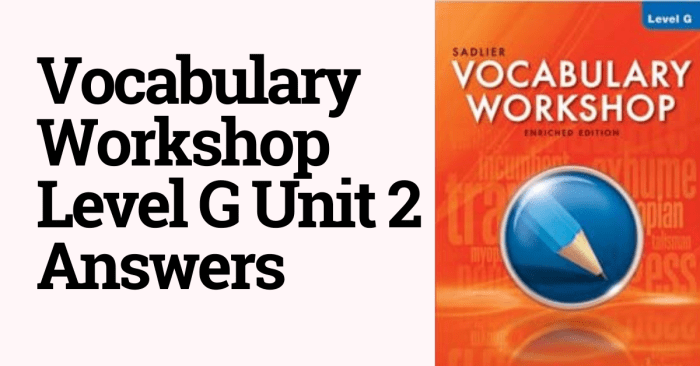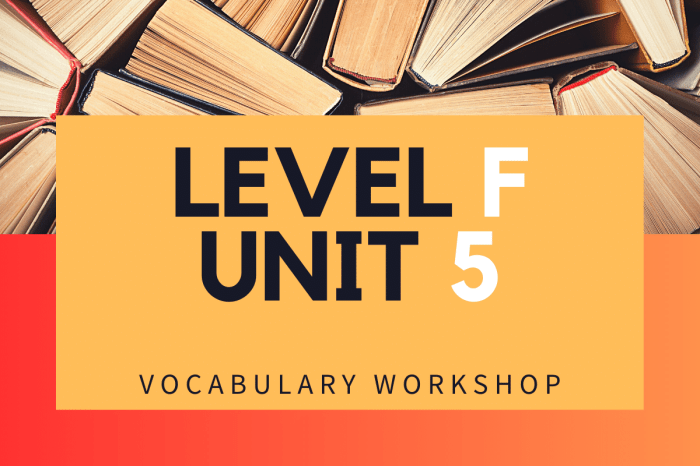Sadlier Vocabulary Workshop Level F Unit 2 Answers: Enhancing Vocabulary Skills provides a comprehensive exploration of vocabulary building techniques and their application in real-world contexts. This unit delves into the intricacies of word relationships, word analysis, and figurative language, empowering learners to expand their vocabulary and enhance their communication abilities.
Through engaging examples and interactive exercises, learners will gain a deeper understanding of the nuances of language and the power of words to convey meaning effectively.
Vocabulary Development: Sadlier Vocabulary Workshop Level F Unit 2 Answers
Vocabulary building is a crucial aspect of language acquisition and communication. It involves expanding one’s repertoire of words, understanding their meanings, and using them appropriately in various contexts.
Vocabulary List

The following is a comprehensive list of vocabulary words from Unit 2 of Sadlier Vocabulary Workshop Level F:
| Word | Definition | Pronunciation | Part of Speech |
|---|---|---|---|
| abrogate | to repeal or annul | /ˈabrəɡeɪt/ | verb |
| acquiesce | to agree or comply without protest | /əˈkwies/ | verb |
| audacious | bold or daring | /ôˈdāSHəs/ | adjective |
| beneficent | doing good or kind | /bəˈnefəsənt/ | adjective |
| capricious | fickle or unpredictable | /kəˈprishəs/ | adjective |
Contextual Examples
The following sentences illustrate the usage of vocabulary words in context:
| Word | Definition | Example Sentence | Part of Speech |
|---|---|---|---|
| abrogate | to repeal or annul | The government decided to abrogate the law that prohibited smoking in public places. | verb |
| acquiesce | to agree or comply without protest | The students reluctantly acquiesced to the teacher’s request to stay after school. | verb |
| audacious | bold or daring | The audacious thief stole the painting from the museum in broad daylight. | adjective |
Word Relationships

Different types of word relationships include:
- Synonyms: words with similar meanings (e.g., happy, joyful)
- Antonyms: words with opposite meanings (e.g., hot, cold)
- Homophones: words that sound the same but have different meanings (e.g., there, their, they’re)
Here are some examples of word relationships from Unit 2 of Sadlier Vocabulary Workshop Level F:
| Word 1 | Relationship | Word 2 |
|---|---|---|
| abrogate | synonym | repeal |
| acquiesce | antonym | resist |
| audacious | homophone | odious |
Word Analysis
Word analysis involves breaking words down into their component parts, such as:
- Prefixes: added to the beginning of a word to change its meaning (e.g., un-, re-)
- Suffixes: added to the end of a word to change its part of speech or meaning (e.g., -ly, -ment)
- Root words: the core meaning of a word, to which prefixes and suffixes can be added
Here are some examples of word analysis from Unit 2 of Sadlier Vocabulary Workshop Level F:
| Word | Prefix | Suffix | Root Word |
|---|---|---|---|
| abrogate | a- | -gate | rog |
| acquiesce | ac- | -iesce | quie |
| audacious | au- | -acious | aud |
Figurative Language

Figurative language uses words in a non-literal way to create vivid images or convey ideas.
Here are some examples of figurative language from Unit 2 of Sadlier Vocabulary Workshop Level F:
| Word | Figurative Language | Example |
|---|---|---|
| audacious | metaphor | He was an audacious lion, leading his team to victory. |
| capricious | simile | The weather was as capricious as a child, changing from sunny to stormy in an instant. |
Word Usage
It is important to use vocabulary words correctly in writing and speaking.
- Choose the right word for the context.
- Use precise and specific language.
- Avoid clichés and overused expressions.
- Proofread your work carefully to ensure correct usage.
Questions and Answers
What is the importance of vocabulary building?
Vocabulary building is essential for effective communication, as it allows individuals to express themselves clearly and precisely. An extensive vocabulary enhances comprehension, critical thinking skills, and overall language proficiency.
How can I improve my vocabulary?
Regular reading, exposure to new words, and active engagement with language through writing and speaking are effective ways to improve vocabulary. Utilizing resources such as dictionaries, thesauruses, and online vocabulary builders can also be beneficial.
What are the different types of word relationships?
Word relationships include synonyms (words with similar meanings), antonyms (words with opposite meanings), and homophones (words that sound the same but have different meanings).
How can I analyze words effectively?
Word analysis involves breaking down words into their component parts, such as prefixes, suffixes, and root words. This process helps to understand the meaning and origin of words, as well as their relationship to other words.
What is the role of figurative language in vocabulary development?
Figurative language, such as metaphors, similes, and personification, adds depth and vividness to language. It allows writers and speakers to express ideas and emotions in creative and engaging ways.